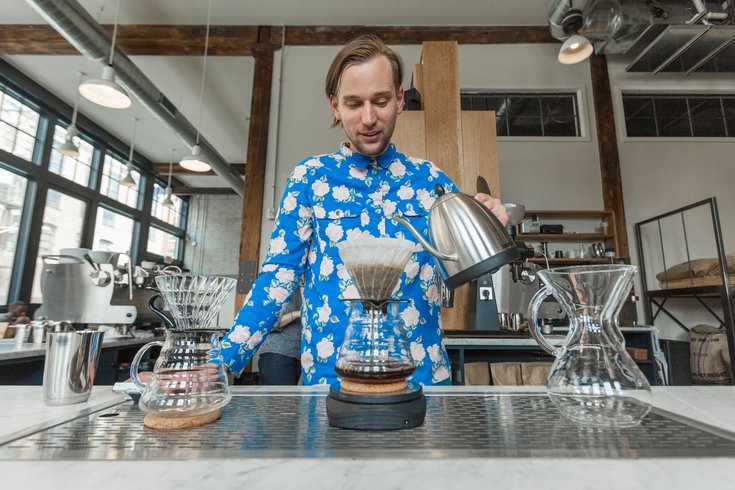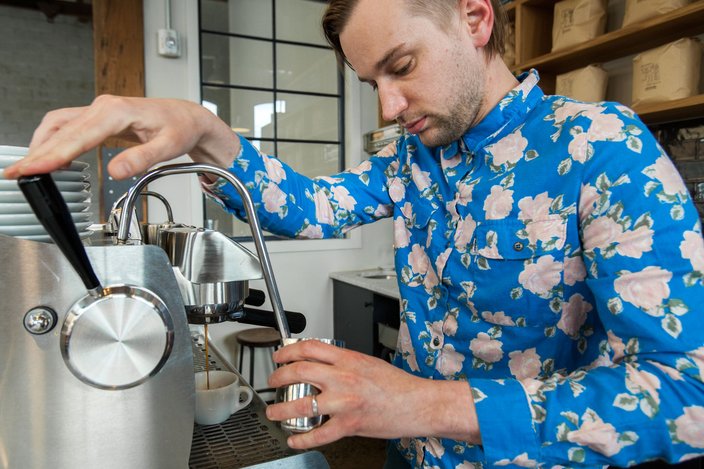
April 21, 2015
 Thom Carroll/PhillyVoice
Thom Carroll/PhillyVoice
Austin Dryden, general manager at ReAnimator Coffee, uses a pour-over brewing method at the shop's Kensington location.
Serendipity is what led Austin Dryden to his job as a barista for ReAnimator Coffee, but skill is what made him general manager.
“ReAnimator was opening this shop basically two weeks after my wife and I moved here, so I bugged them -- I wore them down, and they gave me a job [as a barista]," Dryden told PhillyVoice.
After a year, he finally got the bump up to general manager for the Fishtown-originated coffee shop and roasting company. For a barista, it was like grasping the Holy Grail.
"In a grander sense, it was quite a relief," he says. "It really did validate my feelings that this was a potential career path for me and not just a job I was doing.”
That validation comes after years of training and re-training as a barista -- for Dryden and anyone else entering the field. Coffee cupping is understanding the science of extraction, milk-steaming and mastering the perfect espresso (and recreating it a thousand times over) -- not to mention the ballooning emphasis on customer service.
Yes, baristas are shouldering the responsibility of an increasingly complicated role, as employers realize that, after a 10-step process of bean-to-brew, it might be worth investing more resources in preparation and presentation.
And that's just it: Being a barista isn't the dead-end role it's made out to be. As much as it's still a college-age-friendly job (thanks, Starbucks), it's also evolving into something a tad more, shall we say, full-bodied. In an era when the best part of waking up is sustainably grown and bee-dripper-brewed Baroida in your cup, it's only natural that the ambitions of your favorite barista are changing.
... But where are the wages to match?
“It was one thing leading to another, until a couple years ago, I realized there wasn’t anything else I wanted to do – I liked coffee so much, and when I tried to think about another job I wanted to do, I only came up with blanks," Gelletly told PhillyVoice. "I fell in love with coffee so much that I would have been sad to leave it.”
In 2013, his coffee career hit a high when he placed second in the Northeast Regional Barista Competition, making him extremely desirable to any coffee employer. In August 2014, after four years of barista work at Ultimo Coffee, he packed up for New York to serve as a representative and educator for Counter Culture Coffee, a prominent roaster and training center both in Philadelphia and nationally.
Why the move, after seven years behind the counter in Philly? Quite simply, the well-paying, coffee career jobs just aren't in Philly -- or at least not yet.
"I do feel like it’s continually growing -- there are coffee companies doing a good job and will be able to offer more of those positions in the future," he says. "But [I'm concerned that] in Philly, if there’s not really a big market for specialty coffee, it may get saturated soon, and there won’t be any opportunities for professional career jobs. ... Some other cities might have a bigger market for specialty coffee. It’s one of those things that I don’t really know a good way to fix, because it’s so dependent on how much people are willing to pay for coffee."
A lack of willingness to pay for gourmet coffee doesn't appear to be the problem. A yearly report released in 2015 by the National Coffee Association indicates that from 2000-2015, gourmet coffee consumption more than tripled. Moreover, in the Northeast, 22 percent of coffee drinkers only consume their coffee outside the home. (This, despite the fact that 45 percent of coffee-consuming respondents said that coffee outside the home is too expensive.)
Consumption numbers are lining up, but the jobs and wages? Not quite. Gelletly says the ballpark estimate of his annual earnings during his last year working behind the counter was between $12,000 and $15,000 per year. That's barely above the 2014 national poverty line of $11,670 for a single person.
Part of the reason wages aren't keeping up, Chelsea Thoumsin, of Philadelphia's Counter Culture Training Center, told PhillyVoice, is price. Customers still need education about what goes into a cup of coffee and why it might warrant a higher price tag. And in Philly, the biggest problem is the unpredictability of a coffee scene that's still baby-faced.
"In terms of other coffee companies in Philly, I’d say the most feasible form of advancement [for a barista] would be a managerial position at a shop or possibly moving up to something like roasting -- we have a lot of local roasters here who are one- or two-man gigs," she says. "But there aren’t a ton of opportunities for moving up into salary-paid coffee jobs, and I think part of that is because the coffee scene in Philly is new. Seven years ago, all that was around was La Colombe."
It's also not over her head that her job is a coveted one; Counter Culture Coffee is currently the only barista-training organization of its kind in Philadelphia.
"Working in coffee at this level is a privilege, and I’m aware of that. It’s a different type of work, obviously, but I still respect the baristas like no other – I overtip like crazy," she says. "Knowing how hard they work to make the coffee taste good and provide great customer service means a lot. It’s inspiring when you have the most talented baristas behind the bar keeping a smile on their face – and they deserve to be rewarded for that.”
“It’s hard to make a living just out of being the owner of a coffee shop these days," Nancy Trachtenberg, who owns the Benna's coffee shops in South Philadelphia, told PhillyVoice. "You have to figure out how to be the hustler who pays your bills, and I know very few people who only wear one hat these days.”
And if shop owners are scrounging up change to make their living, it leaves little room for 401(k) plans and other benefits for baristas. Coffee shops that do offer those benefits are often ones that have another source of income -- for example, OCF Coffee House, which offers a higher wage, health insurance after three months and a 401(k) plan, all because of its association with OCF Realty, which can afford to foot the bill.
“It’s not good for street cred, to speak frankly – that’s not a ‘cool’ thing to be associated with, another company that isn’t coffee, but at a certain point, you don’t care whether it’s cool. You have to make a living," Lori Zaspel, general manager for OCF Coffee House, told PhillyVoice. "I know people who left coffee because they couldn’t make a living – they got closer to their 30s and realized it didn’t manifest for them that way. I think you have to be really, really dedicated to make this work as a career."
Will Darwall, co-founder of W/N W/N, has attempted to solve the barista income problem by opening a cooperatively owned cafe in January -- though, given its infancy, it may be premature to call it a success story.
The model calls for co-ownership and profit participation, so that employees -- baristas -- can earn more as the shop does so.
"Profit-sharing seems like the only way to compensate for the sort of unpaid work that goes into training that happens on-shift and off-shift – we read about things, we go to latte art competitions and sort of work harder on getting better in ways that we don’t see reflected in our wages," he told PhillyVoice. "Shops might give raises based on time or showing extra effort, but the key component here is workplace democracy."
If there is a proven solution, it's yet to pop up. But Mark Corpus, co-owner of ReAnimator, agrees with Thoumsin that the first step is to charge more for coffee (he currently undervalues his product) and adjust customers to what it actually costs to make specialty coffee.
Beyond that, though, he says it's about organizing the community and problem-solving from there -- which may happen sooner than you'd think.
"I’ve talked to other café owners about setting up a 'Philly Coffee Conference,' which would basically be about information-sharing, where people who have opened shops get to share their experiences with people who are interested in opening a shop or have their own shop but want to know more about people who run theirs," Corpus told PhillyVoice. "I want to evaluate the coffee scene in Philly, and I think we need to do that. It's important. And talking about how to pay people a better wage and coming up with creative solutions on how to do that is part of it."
That conference, which is still in the early stages of planning, would be slated for this summer.
"The reality is that a barista is not a career position," says Dan Cox, president and founder of Coffee Enterprises, a certified organization that tests specialty coffee and offers business consulting. "I’ve yet to meet a barista who’s been in a job for more than five to seven years. And it’s about compensation."
Which is to say, being a barista alone -- without opportunity for promotion to management, roasting or training -- is not currently sustainable.
The trend he sees, he says, is that baristas may stick around for seven years and then re-evaluate when they realize that either the jobs they want (like Gelletly's or Thoumsin's) are scarce, or they tire of the unconventional work schedule.
He's also wary of what impact coffee competitions may have on the perceived glamour of being a barista.
"I’ve seen these barista competitions, which are so incredibly cool -- I’ve been in the business 34 years, and there’s no way I could do this stuff these kids do. But that said, you win a competition, and I’ve seen so many baristas that win national, international, etc., and when they win the national, they think they’re a rock star and go around the world consulting," he says. "And then, suddenly, you’re no longer a champion, you’re a past champion, and who’s going to pay you to come in and teach other baristas? Very few companies will."
For companies he interacts with, he says, they seldom pay benefits to employees out of fear that, shortly after enrollment, they'll drop out -- ultimately costing them more money.
“It’s hard for restaurants to offer a lot of benefits to a transient group of employees," he says.
Shift-based profit-sharing is the most viable solution for increasing barista income, he says, but it also may be about changing tip culture, already being experimented with as shops present customers with in-your-face prompts for percentage-based and dollar-specific tips through point-of-sale software like Square.
In the end, he notes that when as much effort goes into the long process of procuring and roasting a coffee, it's always worth it to add incentive to the person handling the last and most vital part of a coffee bean's journey: presentation.
"When it comes to charging more than $3 for coffee at any restaurant," he says, "don’t let the lowest-paid person serve it.”
